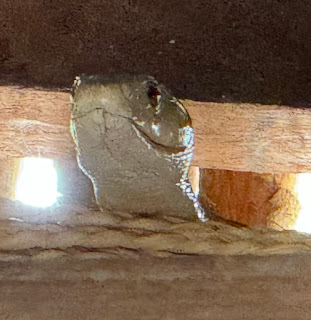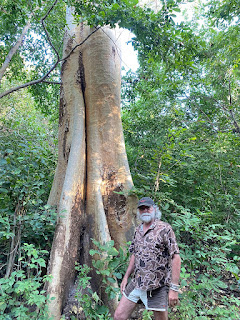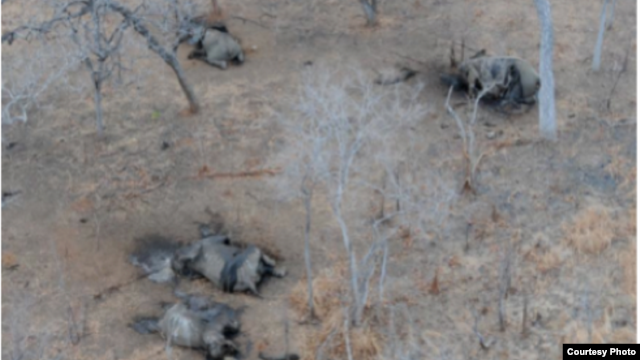
A short ditty by the famous Mr. Littleton. I asked him to write something for the blog years ago it seems. Finally a few words and as you will hear he is torn between comic relief and serious measures but he entwines them well. Listen close to the seriousness of the specifics that pertain to the area, for this is the real message. It's a suttle read for the most part but the facts ring out that our beloved piece of Africa is destined to painfully fade with the rest of Africa.
"Same Ole Same O" the African way throws down a challenge and too few of the faithful to march.


I know he's back in the bush with us because my head hurts and my tongue feels like it's stuck to the side of my face. Two bottles of rum lie empty next to the camp fire. Only habit has dragged me squealing from bed as the morning glow infuses the Lugenda with the colors of Africa that I live for. The bird chorus shows them to be in significantly better condition to begin their day. Strong wet coffee seeps into my drought stricken blood stream as I sit happily in the cool dawn. It's good to have him here.
------------------------------------------------------------



With the dust of the long drive washed off with a woodsmoke scented shower, we had set upon the rum. Elephant had cracked branches as they fed past the camp. Paula shook her head and headed for the kitchen knowing it would be a long night.
'So, what's been going on while Ive been away?'
'You know, Skeeter,' I begin, then realize my mistake. He has asked us not to call him Skeeter. It is how we were introduced years ago and it's a hard habit to break. It is an old nickname with annoying associations for him. So he became TAFKAS, The Artist Formerly Known As Skeeter. This mouthful is now Taffy - also the name of a legendary Rhodesian Special Forces operative, and this he finds amusing.


I try again, 'Most of the characters are still around. Anabela still has a tight reign on the basics, and is keeping the show running on a ludicrously small budget, but the perennial problems are not going away, in fact they are growing at the same rate as the game, which is doing incredibly well. Problem is this is all conflicting. The human population within the Reserve is out breeding everything else. Every girl or woman over about 13 has at least one child on her hip. We still do not have any clear perameters of where people can live and farm. Cultivation is still slash and burn, with new fields being opened every 4 or 5 years when the soil gets tired. It's all good in theory having people living in a Wildlife Reserve, but in practice the remedies for conflict are always two steps behind. We are very fortunate to have dedicated men like Wim Eberson involved with the anti poaching, and an unusual situation where most operators have bought into
creating a solid management model.


'Adel still subsidizes our operations, the logistics here are extreme. He has been a bloody saint. I wish he was able to make it out more often to enjoy this place.
Poaching is now becoming an issue. The Chinese are buying anything they can lay their hands on. Ivory has gone from $10 a kilo to over $50. Zebra skins go for around $200, a leopard for close to $500 and a lion skin for as much as $2000. There is talk that the bones are being sold as a replacement for tiger bones, but we have not been able to verify this. In an economic system like this that's crazy money for these guys. It's a new gold rush that we are not prepared to cope with.

'Oh hell man! So what are the Government doing about it?'
'Well you don't get votes from the wildlife. To most communities these animals are still considered a bloody nuisance or a danger. Despite our best efforts to change this mindset - 20% of our concession fees go to the communities, we try to help with community projects - there are very few who get it yet. Sheesh, these wilderness areas will be priceless within our lifetimes if we could keep them safe. Perversely to do that we will have to protect them from the very people we are ultimately protecting them for. Much of Mozambican environmental law is still based on the antiquated Portuguese system which gave very little value to wildlife or forests. It is not a criminal act to kill an elephant for instance. There is a small fine and no jail time. Most offenders are out and about 3 days later grinning at you. Basically we have been given no teeth to deal with these issues. More progressive legal systems in Africa make potential miscreants think
twice. In Zim there was a shoot to kill policy with armed poachers, and a 7 year mandatory sentence for a conviction of elephant or rhino poaching. It's incredibly frustrating. Anyway, on a brighter note, how are the Gals in your life?'

Taffy is surrounded by beautiful women. Sandi his wife is gorgeous inside and out, and is fiercely supportive of a man whose lifestyle is a little wacked, tolerating his free spirit where most women would loose the plot. He kept his lovely daughter Mareth safe from the boys in the bush until she was able to find herself a decent young man to marry and has now made him a grandad, and I have had the good fortune to be fed fried chicken by his Mom who is a wonderful lady.


'they are all good, I am hoping Sandi will make it out here again this year. It's been 6 years since she was here last.

Lilepe arrives with a plate of prawns for snacks. We are both hungry and they don't last long. Safari season is about to start so we are eating well. The routine diet of rice and beans will be replaced by meals cooked over a bushfire that would not be out of place in a fine restaurant. It has always amazed me how our native cooks do this under crude conditions and when our style of food is so foreign to them. The rum is getting better with every swallow and the noise level is rising. Leonard Skinner is trying unsuccessfully to depress us on Audwins iPod. The elephants are now splashing and rumbling as they enjoy the cool Lugenda river.






I knew I liked Audwin the moment I met him. He is that laid back Southern Gentleman, hands on farmer hybrid, observant artist, sixties wild child - I should qualify that - he would have been as comfortable exploring the meaning of life in the 1960's as exploring the world in the 1860's. Cut of a broader cloth, psychedelic one side, sepia the other. Normally calm, I know he has a mans temper when necessary. What I like most is that he is honest. 'When do you start work on those giant aluminum statues? ' I ask. 'Well the City has just about raised the money needed to get started. It's ready in my head, just waiting for the green light.'
Our discussion flows from issues relating to the Reserve, to the latest baboonery of mutual friends. That commercial companies are giving seed to local farmers to plant tobacco on islands and stream banks in a pristine wilderness, and there is the associated abuse of insecticides to kill fish and poison game. The animals killed in this manner were sold to unsuspecting families resulting in the death of children and even adults. The number of new people coming from Tanzania and other districts, where they had already over used their own resources to fish the Lugenda River or cut timber, more aggressive, they out compete the local fishermen who have lived in sync with the river for generations. There are solutions, but not without political will. Government's lame answer - poverty - and that the operators must find answers. There you hold the baby. None of them willing to make the unpopular decisions needed to secure a sustainable future. The next
generation won't think much of their lack of fortitude.
The conversation rambled on, we lamented all politicians, condemned all poachers and their masters, and willed 'progress' in our shrinking world to slow. Aside from bitching we laughed a lot, and laughing is very thirsty work. ' Do you miss Zimbabwe? ' he asks. 'Absolutely, you only realize what you had after you lose it. It's still surviving even with all the nonsense there. I miss my friends the most. It's funny how proud and territorial you get over a country. Pity human nature screws it all up. I think I may have shifted my loyalties to an ideal rather than a specific place.' I slur.



A lion moans from the opposite bank, and muddy hippos chuckle at his reverberating gloom. The rum has taken the edge off a crispness that has crept into the air. Even at our age, taking a pee in the bush is competitive. His artwork is better than mine, but he does not know that my claim to fame at school was weeing over the school bus, a record I believe still stands to this day. We stagger back to the fire each believing himself to have been the victor.
There are 3 of them sitting in front of me now. I can feel the stupid grin hacking my head in half. Skeeter, Audwin and Taffy. The firelight dances as they merge then separate again. Father son and holy terror. He is trying to tell me about a time shit happened in Central America but I have lost my grasp of English, although I seem to have swum the language barrier with the local dialects and am busy making a fool of myself in Swhaili. I notice through the haze that Paula has taken herself to bed. Hope she hasnt been eaten on the way.
'We are ludicrously privileged, Taffy, challenges are good. I just hope we can hold the line long enough ' is the last coherent thought that crosses my mind.
The last I remember of the evening is Audwin moving towards his tent on all fours playing the last post on a varmint call he has produced from somewhere.
-----------------------------------------------------------
'I had better get the team out onto opening roads and see what the anti poaching lads have been up to before he wakes up' I think to myself. There is one bottle of rum left, and a lot still to talk about.
Luwire
























































